At the outset of giving testimony in court this week I was asked a standard set of questions: name, date of birth, and job title. Particularly the last one made me think as the information I could render was likely irrelevant for the testimony.
It did not provide the judge a better understanding about my professional background or relevant experience, nor did it contribute to establishing the context of the testimony. For the regimented proceedings in court, it most certainly did not serve as an icebreaker or conversation starter either. Besides, it was the public prosecutor who did most of the questioning.
Although it was a perfectly harmless question, I could not fathom the relevance thereof. It made me consider why we are so fixated on the job title someone holds and whether this is truly the most valuable information we can obtain about someone. In fact, I believe it has some serious disadvantages.
- Focusing on job titles alone can lead to a limited view of the person, overlooking their human aspects and personality.
- Job titles alone are a generalization and do not provide in-depth insight into an individual’s specific skills and personal characteristics.
- It can lead to stereotyping, where someone is judged based on their job title, regardless of their actual abilities.

Alternative questions will in fact provide a much more relevant and richer insight about your interlocutor. To gain a more nuanced understanding of the person behind the job title, you may consider asking additional or other questions that delve deeper:
- What are your personal values? This helps in understanding someone’s ethical compass and life priorities.
- What is your personal purpose in life? This provides valuable insight into overarching mission and what drives someone beyond their career and allows you to understand whether the purpose and values align with the company’s mission and culture (long-term fit, job satisfaction). It may provide information about deeper motivates and what makes someone excel in their professional life. It can also help identify whether they are driven by intrinsic factors or external rewards.
- What inspires you in your work? This question can reveal what truly drives and impassions someone, beyond what they do for a living.
- Can you describe a challenge you’ve overcome in your life? This can shed light on an individual’s resilience, perseverance, and problem-solving abilities.
- What does your ideal work environment look like? This question can help assess cultural fit and work attitude.
- Can you share a book, movie, or experience that has changed your perspective on life? This provides insight into someone’s interests and how they view the world.
Asking these questions can offer a more holistic view of who the person truly is beyond their job. It enables to better understand the human qualities, values, and motivations of the person with whom you are engaging, which can provide valuable information when making decisions about for example work relationships and collaboration.
In a world often defined by what we do rather than who we are, it’s important to shift the focus to the person behind the job title. By asking more relevant questions, we can foster deeper understanding and empathy, appreciating the value of everyone, irrespective of their professional title. This will prove particularly important as we go through a time of fundamental change requiring much closer collaboration, solving complex problems together.
And remember that contrary to the voices, images, sounds, and messages that surround and bombard us, our life is about:
- our integrity, not our position
- our authentic voice, not our power
- our name, not our title
- our calling, not our career
- our legacy, not our success1


